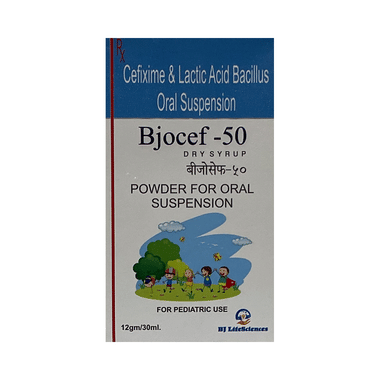-
Cefbert LB Dry Syrup (Rs.71.25)
Composition: Cefixime (50mg) + Lactobacillus (60Million spores)
-
Cefilet LB 50mg Syrup (Rs.71.25)
Composition: Cefixime (50mg) + Lactobacillus (60Million spores)
-
Antiwud LB 50mg Dry Syrup Orange (Rs.74.06)
Composition: Cefixime (50mg) + Lactobacillus (60Million spores)
-
Carecef LB 50mg Dry Syrup (Rs.73.13)
Composition: Cefixime (50mg) + Lactobacillus (60Million spores)
-
Cefo L 50mg Tablet (Rs.56.25)
Composition: Cefixime (50mg) + Lactobacillus (60Million spores)
-
Bactawell LB Dry Syrup (Rs.75)
Composition: Cefixime (50mg) + Lactobacillus (60Million spores)
-
Ceflax 50mg Oral Suspension (Rs.69.05)
Composition: Cefixime (50mg) + Lactobacillus (60Million spores)
-
Cebaxim 50 LB Dry Syrup (Rs.60.94)
Composition: Cefixime (50mg) + Lactobacillus (60Million spores)
-
Cefipal LB Dry Syrup (Rs.65.63)
Composition: Cefixime (50mg) + Lactobacillus (60Million spores)
-
Cefijab LB 50mg Dry Syrup (Rs.60.94)
Composition: Cefixime (50mg) + Lactobacillus (60Million spores)
All Details About Bjocef 50 Dry Syrup
Find out detailed description, uses, directions of use, side effects, warnings and precautions, frequently asked questions about Bjocef 50 Dry Syrup
Description:
Bjocef 50 Dry Syrup contains two ingredients, one antibiotic and one probiotic. While the antibiotic helps kill a wide range of bacterial infections, the probiotic prevents the antibiotic from causing digestive problems as a side effect. It does so by restoring the balance of good bacteria in the intestine.Donate Bjocef 50 Dry Syrup to your child with or without meals. Though the risk of developing a stomach upset is less with this medicine, giving it with meals will further reduce the risk. The dose and duration depend upon the type and severity of the infection, so stick to the dose, time, and way prescribed by the doctor. If your child vomits within 30 minutes of the intake, give the same dose again but do not double dose if it is time for the next dose.
Bjocef 50 Dry Syrup may cause some minor and temporary side effects in your child. These may include vomiting, diarrhea, nausea, abdominal pain, and allergy. Usually, these episodes subside once your child’s body adapts to the medicine. However, if these side effects persist or become bothersome for your child, report to the doctor without any delay.
Narrate your child’s complete medical history to your child’s doctor, including any previous episode of allergy, heart problem, blood disorder, birth defects, airway obstruction, lung anomaly, gastrointestinal problem, skin disorder, liver impairment, and kidney malfunction. This information is critical for dose alterations and for planning your child’s overall treatment.
Directions For Use:
Take this medicine in the dose and duration as advised by your doctor. Check the label for directions before use. Measure it with a measuring cup and take it by mouth. Shake well before use. Bjocef 50 Dry Syrup may be taken with or without food, but it is better to take it at a fixed time.Side Effects:
Bjocef 50 Dry Syrup does not pose serious side effects and is well-tolerated by children. In case the side effects do occur, they’re likely to subside once the body adapts to the medicine. Consult your child’s doctor if these side effects persist or bother your child. The most common side effects include-Ordinary side effects of Bjocef
- Nausea
- Vomiting
- Abdominal pain
- Allergy
Warning & Precautions:
However, consult with your child’s doctor before giving Bjocef 50 Dry Syrup to your child in case of a severe form of liver disease.
FAQs:
My child is suffering from liver failure and his investigations showed high blood ammonia levels. Is it safe to give Bjocef 50 Dry Syrup?
What if I give too much of Bjocef 50 Dry Syrup by mistake?
Are there any possible serious side effects of Bjocef 50 Dry Syrup?
Can other medicines be given at the same time as Bjocef 50 Dry Syrup?
Can I get my child vaccinated while on treatment with Bjocef 50 Dry Syrup?
The mucus coming out of my child’s nose is yellow-green. Is it a sign of a bacterial infection?
Written by:
Dr. T. Sharmila Krishna
M.B.B.S., MD (Biochemistry)
Reviewed by:
Dr. Sureshbabu Yadav
M.B.B.S., DIP.DIAB, F.R.S.H
Disclaimer:
Getomeds primary intention is to ensure that its consumers get information that is reviewed by experts, accurate, and trustworthy. The information and contents of this website are for informational purposes only. They are not intended to be a substitute for professional medical advice, diagnosis, or treatment. Please seek the advice of your doctor and discuss all of your concerns about any disease or medication. Do not disregard or postpone seeking professional medical advice because of something you read on Getomeds. Our mission is to support, not replace, the doctor-patient relationship.
